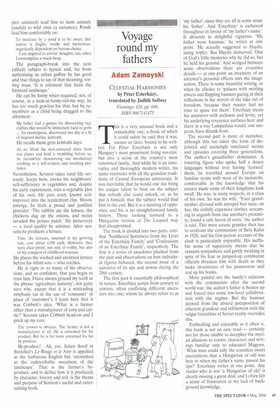Voyage round my fathers
Adam Zamoyski
CELESTIAL HARMONIES
by Peter Esterhazy, translated by Judith Sollosy Flamingo, 00, pp. 846, ISBN 0007141475 This is a very unusual book and a remarkable one, a book of which it could safely be said that it was, sooner or later, bound to be written. For Peter Esterhazy is not only Hungary's most prominent living novelist, but also a scion of the country's most renowned family. And while he is an innovative and thoroughly modern writer, his name resonates with all the grandest traditions of Central European aristocracy. It was inevitable that he would one day bring his unique talent to bear on the subject that nobody else could unlock, or, as he put it himself, that the subject would find him in the end. But it is a meeting of opposites, and his is no straightforward family history. Those looking forward to a Hungarian version of The Leopard may feel disappointed.
The book is divided into two parts, entitled 'Numbered Sentences from the Lives of the Esterhazy Family' and 'Confessions of an Esterhazy Family', respectively. The first is a series of anecdotes plucked from the past and observations on how individual figures behaved, the second more of a narrative of its ups and downs during the 20th century.
The first part is essentially philosophical in nature. Esterhazy jumps from century to century, often conflating different ancestors into one, whom he always refers to as
'my father', since they are all in some sense his 'father'. And 'Esterhazy' is eschewed throughout in favour of 'my father's name'. It abounds in delightful vignettes. 'My father went bananas,' he writes at one point. 'He actually suggested to Haydn, string triplet. But Haydn demurred. One of God's little mysteries why he did so, but he held his ground.' And wedged between acute observations there are evocative details — at one point an inventory of an ancestor's personal effects stirs the imagination. There is some beautiful writing, as when he alludes to 'palaces with swirling towers and flapping banners gazing at their reflections in the mirror of the lake out of boredom, because their master had no time to spare for them'. Esterhazy treats his ancestors with archness and levity, yet his underlying reverence surfaces here and there in a way Lampedusa would, one suspects, have shrunk from.
The second part is more of narrative, although this too takes the form of disjointed and seemingly unrelated scenes and episodes covering three generations. The author's grandfather dominates. A towering figure who spoke half a dozen languages without ever having 'learned' them, he travelled around Europe on familiar terms with most of its monarchs, comfortable in the knowledge that his estates made some of their kingdoms look small. He was, in many respects, in a class of his own. So was his wife. 'Your grandmother dressed with intrepid bad taste; on her, the sinfully expensive clothes, screaming in anguish from one another's proximity, found a safe haven of sorts,' the author is told. This most serene grandee then has to confront the communists of Bela Kuhn in 1920, and his first-person account of the clash is particularly enjoyable. His ineffable sense of superiority means that he remains sympathetic and gently mocking in spite of his fear as jumped-up communist officials threaten him with death as they make inventories of his possessions and seal up his books.
More painful are the family's relations with the communists after the second world war: the author's father is beaten up and forced into some low-level collaboration with the regime. But the humour derived from the absurd juxtaposition of inherent grandeur and refinement with the vulgar brutalities of Soviet reality overrides this.
Enthralling and enjoyable as it often is, this book is not an easy read — certainly not for those unable to decypher the myriad allusions to events, characters and writings familiar only to educated Magyars. 'What man could tally the countless sweet associations that a Hungarian of old was heir to when my father's name passed his lips?' Esterhazy writes at one point. Any reader who is not 'a Hungarian of old' is clearly missing a great deal, and I often felt a sense of frustration at my lack of background knowledge.












































































 Previous page
Previous page